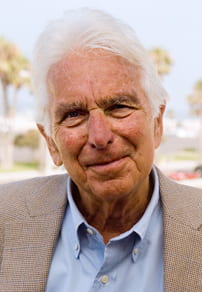This blog first appeared on the Bloomberg Businessweek website.
Robert J. Thomas and I met in early fall of 1999 determined to write a book about how generational differences could impact leadership behavior. Would successful young leaders, 30 years old–raised after the Depression and World War II–hold divergent attitudes and values that would distinguish them from successful leaders 40 to 60 years older?
The next three years were an odyssey full of fun, frustration, and surprises: identifying and interviewing terrific leaders in these two age groups who were willing to spend hours with us, videotaping included. We did pretty well at that. Among the geezers were Robert Galvin, the former CEO of Motorola (MSI); Frank Gehry, the world-famous architect; Frances Hesselbein, the former CEO of the Girl Scouts of America; and John Wooden, the legendary UCLA basketball coach. Our geeks did pretty well for themselves, too, some of them in their early twenties: Sky Dayton, founder of EarthLink (ELNK) and Boingo Wireless (WIFI); Steve Chen, co-founder of Embark.com.; and Wendy Kopp, founder of Teach for America.
Three years after we met, our book was published–exactly 10 years to the day this blog is being written.
In ’99, Bob was senior research fellow with the Accenture (ACN) Institute for Strategic Change in Cambridge, Mass., and is now executive director of the Accenture Institute for High Performance. (He’s also a visiting professor at Brandeis University’s International Business School.) Bob’s credentials are solid, close to intimidating: He’s served on the faculties of MIT’s Sloan School of Management and School of Engineering, and he has consulted for a wide variety of global companies in the fields of leadership development, organizational design, and implementation of new technology.
The only dubious edge I had on Bob back then was seniority. In ’99, he was a feisty (and enviable) 47, a young dog. I was an old dog, an ancient 74. We decided to call the book Geeks and Geezers. The Harvard Business School Press bravely acquiesced to our title, even knowing at the time that the most powerful Washington lobby for seniors, the AARP, would not review it in their magazine, second in circulation only to People magazine. (I weep at our naïveté; we later changed the title to the more sanitary Leading for a Lifetime. It didn’t spike sales.)
As our interviewing proceeded, the book we proposed to write about the generational differences swerved into the attributes both groups shared. We discovered that all 45 of our leaders, age 30 or 75, evidenced five basic qualities that seemed organic in their ability to lead: adaptive capacity, a spirit of inquiry, the ability to engage others through shared meaning, a distinctive voice, and unshakable integrity. Today, I am more convinced than ever that these five qualities mark all exemplary leaders, regardless of age, era, gender, ethnicity, or race.
Audacious as that claim sounded a decade ago, in the past several weeks, prompted in part by the rhetorical mantras heard at the Republican and Democratic nominating conventions (both of which underscored the significance of education to sustain our “competitive advantage”), the media have enthusiastically chimed in. On Sept. 8 and 9, New York Times op-ed columnists Joe Nocera and Thomas Friedman focused on this issue. Friedman’s take was a conventional and folksy one, words that could have been taken from Poor Richard’s Almanack. Because of seismic changes brought about by the usual suspects, globalization and technology, Friedman writes: “The truth is, if you want a decent job that will lead to a decent life today, you have to work harder, regularly reinvent yourself, obtain at least some form of postsecondary education, make sure that you’re engaged in lifelong learning and play by the rules.”
Nocera’s “Ray of Hope” column was based on a book written by Paul Tough, a former New York Times Magazine editor, How Children Succeed. The premise and promise of the book, as Nocera writes, is that “simply teaching math and science–the so-called cognitive skills–isn’t nearly enough.” That’s especially true for those who have grown up in underserved, poor neighborhoods. Tough argues that education should focus on “noncognitive skills,” which he labels as “character.” (In preparing a lecture on character about 15 years ago, my Oxford English Dictionary listed 37 discrete definitions of that word.)
Tough understands character to include traits such as “resilience, integrity, resourcefulness, professionalism and ambition.” Bob Thomas and I used similar if not identical words to capture the traits of our successful geeks and geezers. Yes, most of our top B-schools have courses on “ethics” and “sustainability.” But the character factors should have far more prominence in our syllabi and courses. Everyone seems to agree that, as Friedman puts it, “to deliver a decent life and a chance for your children to have a better one” depends on character.
How we infuse that organically into the formal curriculum and experiences of our business education isn’t a walk in the park. In my next blog, with Bob Thomas’s help, I’m going to provide some specific steps and ways we can give life to those noncognitive factors of character.
Join the discussion on the Bloomberg Businessweek Business School Forum.